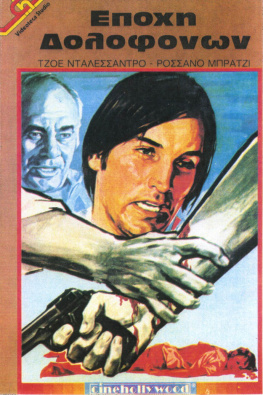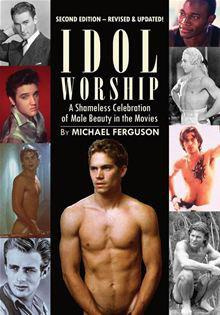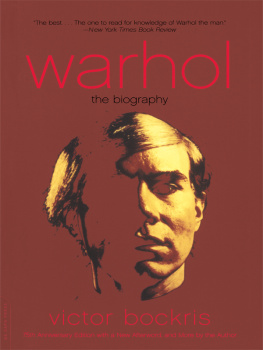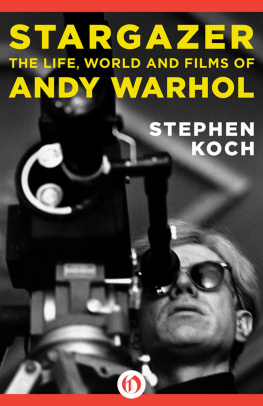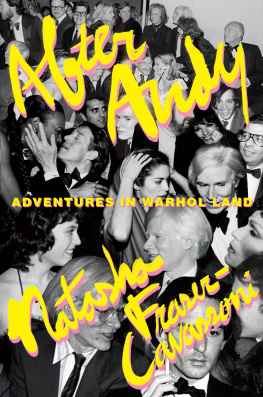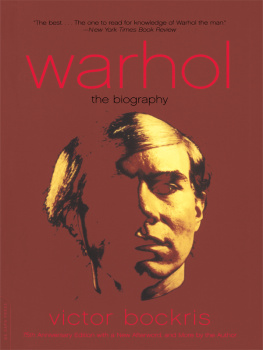Joe Dallesandro
Warhol Superstar, Underground Film Icon, Actor
Michael Ferguson

CONTENTS
Little Joe, Superstar
When people ask me how do I feel about being in the movies, about having my pictures in the movie ads every day, I dont like to say I dont feel anything, because sure, I do. But its not like a lot of people probably think I should feel. I dont want to sound conceited. I meanIm just Little Joeand I hope people like me.
Joe Dallesandro, age 20, July 1969 in Action World: An Entertainment Guide to New York.
Whatever isnt in there, just make it up. That was Joe Dallesandros catchy credo as expressed to journalists during the earliest days of his fame when he learned that any exposure was better than no exposure at all.
One of the first interviews that Id done really set me off, he explains. It was with Rex Reed. Hed done this interview and he wrote this shit, picking up on some of the stuff I had said but then getting it confused. He elaborated on these little things Id said, and I could really have cared less, but he was off on his facts and he wrote that my father had been married one more time than he was, or something similar, and it really upset my dad. That it upset my father, it upset me, and it made me really hate Rex for years. It also made me kind of shy about how I did my interviews because something could be read the wrong way, misconstruedor if it was my fault and I didnt get the facts exactly right, people could get offended.
He takes the time to both name and count his fathers wives. 1, 2, 3, uh, 4.
That was four, not fivethats not bad. He gets mad if I get the facts wrong. Even if hes gone. [Joes father passed away in 1993.] Im sure hed get pissed off if I said five and there were only four.
I expected Joe Dallesandro to be disquietingly quiet, perhaps so low-key that Id have to affix my tape-recorder microphone to his chin just to register a reply when I first interviewed him in the summer of 1995.
So much for being smart enough not to confuse the movie image with the actor who provides it.
Joe, in fact, can be quite the lively conversationalist. True to his urban roots, he talks like the inner city kid he still harbors inside, casually dispersing his fucks throughout conversation and tending to lapse in and out of first-person present-tense dialogues when recalling conversations and events from his distant past.
All this stuff is true, he reassured me. Because when you make up shit about your life its too hard to remember.
And yet, with almost Warholian counter-logic, he is still fond of telling the reporters to wing it. He rarely reads the finished product.
Its because, I think, hes the real thing.
In 1973, for the hell of it, Norman Mailer socked a silent Joe in the arm at a party and was happily and unexpectedly the recipient of a return blow to the stomach, causing the writer to proclaim loudly to the rest of the crowd that hed found the only real man in the whole place.
Not schooled in the studio-bred refineries of giving good PR, his voice, his word choice, and his manner come directly from a life lived on hard streets and through hard times. Hes just a kid from the neighborhood who has found himself in the creepy realm of celebrity where unnatural significance is assigned to every ordinary thing a guy does.
His earliest interviews capture a charming naivet, an inability to be much other than himselfthough perhaps with a tendency toward exaggerating the cocky, rough-and-tumble sort of scrapper he wanted others to see. This has caused some writers to comment on his simplicity and others to come away seriously mistaken about his intellect.
Viewing Joe through elitist eyes is a mistake, however. Hes a good storyteller if you get him going and he holds nothing back when it comes to offering an opinion on person, place, or thing. He seems as largely devoid of ego when talking about his career and the famous people whom hes encountered as youd hope a regular Joe like Joe would be. Hes not a name-dropper. You have to ask him about the rich and famous hes rubbed up against.
So what happens when Joe Dallesandro speaks, when an appealingly enigmatic Superstar of the underground film movement of the sixties and seventies at long last decides to talk in detail about his life and his career?
For myself, there was the fear of demystifying a potent mystery. Maybe I dont want to know what Joe was thinking when he did that scene in Flesh (1968). Maybe itll spoil it if I find out that he has a different attitude than him. Or just maybe Ill discover that even Joe doesnt know who that other Joe is or what he can possibly mean to his fans. After all, once committed to film, the actor no longer owns the image. In a sense, he belongs to us.
Joseph Angelo DAlessandro III was born December 31, 1948, in Pensacola, Florida. His father was an 18-year old Italian-American sailor at the time, stationed at the naval base there, who had married 14-year old Thelma Testman. Joe Sr. had been trained as an electrical engineer. His occupation would often take him between New York City and his Florida home base. Joey had been born when Thelma was just 16. (The birth certificate spelling of the family name was DAllesandro, repeating a mistake from his fathers military papers. After Joe became famous, his dad had his own name legally changed back and thus corrected to DAlessandro.)
It was in New York, almost exactly one year later, on December 28, 1949, that Thelma gave birth to the couples second son, Robert. There was trouble ahead for the DAlessandros, however, even beyond the challenge of having children when the mother was so young. Sandy, as Thelma was now nicknamed in an abbreviation of DAlessandro, was arrested in Florida for interstate auto theft and subsequently convicted and sentenced to five years in a Federal penitentiary.
Joe Sr. maintained custody of their children in the separation and divorce that was to follow. He took the boys up to New York with him. But maintaining full responsibility over his sons was something he felt he couldnt do. Apparently it was a burden no one in the family felt capable of handling. Even with other relatives in the area, including a grandmother, the boys ended up at Angel Guardian Home awaiting foster care. They were housed separately, with Joe in Harlem and Bob at the Brooklyn branch, since the younger brother wasnt yet potty-trained.
The facility was very inner city and populated largely with minority children, according to Joe. The severance from family had to be devastating to the boys, but much of what Joe remembers about his time there is informed by what he was told years later. Being white was an advantage, for instance.
Id walk up to the glass window and say, Will you be my mommy? Joe recalls. And, of course, a white person looking down at the only white person in this institution in Harlem wasnt going to say, No, Ill take the black boy over there. So pretty much I had the choice of any white person who walked in there. It was just a matter of deciding which one I was going to say Will you be my mommy? to, and it was hard. I didnt want to say it. So, you see, events in my life prepared me to be the kind of actor who could just come in off the streets and do it. I was taught to deliver lines when I was very young.
Not only did this impact the psyche of a little boy of three or four now suddenly surrounded by strangers and vaguely aware that he was being looked at by people who might want to take him away, but it also made him fearful that such a decision would mean he would go alone, leaving his little brother Bob behind, signifying its own kind of abandonment unavoidably understood as no ones fault but his own.

